Coach of record-setting 1968 U.S. Olympic track team
- Share via
Payton Jordan, a star sprinter at USC in the 1930s who went on to coach the U.S. track and field team to a record-setting performance at the 1968 Olympics, has died. He was 91.
Jordan, who coached at Stanford from 1957 to 1979, died Thursday at his home in Laguna Hills, according to the university. He had cancer.
As Olympic coach for the Mexico City Games, Jordan presided over an impressive U.S. roster that included James Hines in the 100 meters, Tommie Smith and John Carlos in the 200, Lee Evans in the 400, Bob Beamon in the long jump, Dick Fosbury in the high jump, Bob Seagren in the pole vault and Al Oerter in the discus.
His team also confronted an unusual set of challenges. The altitude of 7,546 feet was favorable for some events, such as the long jump, where Beamon set a world record of 29 feet, 2 1/2 inches that would stand for 22 years. But the thin air posed problems for endurance runners.
Many of the black athletes on the U.S. team, caught up in the nascent black power movement, discussed an Olympic boycott. Smith and Carlos were expelled from the Games after they staged a protest on the awards stand after winning gold and bronze medals in the 200 meters, silently bowing their heads and raising gloved fists during the playing of the national anthem.
In the end, the U.S. men’s track team won 24 medals -- 12 of them gold -- and set six world records.
“We just sat down and talked about how hard everyone worked for so long to get ready for this lifetime opportunity,” Jordan told The Times in 1989. “It was just something we had to work through and overcome.”
Jordan knew something about competition.
He won varsity letters in track at USC from 1937 through ‘39, when the Trojans were in the midst of a nine-year stretch of NCAA championships. He ran a leg on the 440-yard relay team that set a world record of 40.5 seconds in 1938 and was co-captain of the team the next year.
While at USC he also played rugby and was on the junior varsity football team.
After retiring as Stanford’s coach, he dominated masters track meets between the ages of 55 and 80, setting world records in the 100 and 200 meters in his age groups.
Jordan was born March 19, 1917, in Whittier and grew up in Pasadena. After graduating from USC in 1939, he married a year later. He and his wife, Marge, had two children. She died in 2006.
He served in the Navy during World War II, had a short stint as track coach at Redlands High School and became track coach at Occidental College in 1946. He moved on to Stanford in 1957. He also served as an assistant track coach for the 1960 U.S. Olympic team.
Jordan is a member of numerous halls of fame, including those of USA Track and Field, USC, Occidental and Stanford, which hosts an annual invitational track meet named in his honor.
He never tired of athletic competition.
“For all its warts, it’s one of the wonderful ways to bring vitality into the world,” Jordan told the Santa Barbara Independent in 2007. “Young people striving to be the best . . . men and women expressing themselves to the fullest. You put on those running shorts and toe the line. You look down the track, alone in your lane. There’s nobody that can substitute for you, no one to give you more courage. There’s just the tape and the stopwatch. No excuses. No second chances.”
--
More to Read
Go beyond the scoreboard
Get the latest on L.A.'s teams in the daily Sports Report newsletter.
You may occasionally receive promotional content from the Los Angeles Times.






